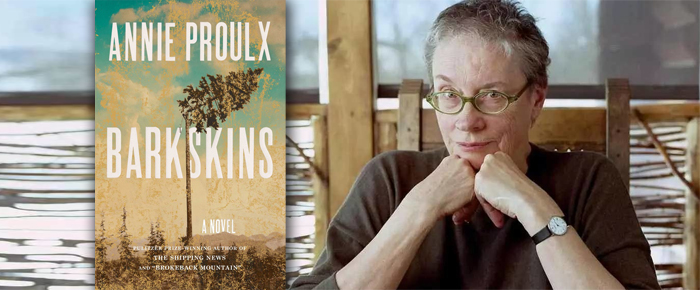
By Heidi Simmons
—–
Barkskins
by Annie Proulx
Fiction
—–
Can civilization reverse the damage that’s been done to the earth over the last three centuries? Is there time to save the planet for continual human habitation? In Annie Proulx’s Barkskins (Scribner,736 pages) generations of a lumber family discover it may be too late.
Barkskins begins in 1693 with the arrival of two young Frenchmen, René Sel and Charles Duquet, to New France (that eventually becomes Canada.) They are both illiterate, indentured servants working for a “seigneur” and timber man. They become wood cutters –or barkskins. Sel works hard in hopes that someday he will have land of his own. Duquet can’t take the hard work and one day disappears in the woods.
Sel is forced to marry an indigenous Mi’kmaw woman by the seigneur. She was formally his mistress. But Sel falls in love with the older woman and has children with her. He eventually inherits the property after the seigneur dies without heirs. When Sel dies his family loses the property because they are Indians. They return to their ancestral home and Mi’kmaw family.
Duquet meanwhile makes his fortune in the fur trade. Soon his portfolio includes lumber. Remembering the seigneur, Duquet becomes a shrewd and ruthless timber man and sets out to dominate the lumber industry of the new world. He marries to further his business relationships, adopts sons and then has two children of his own. He changes his name to Duke and calls his company Duke & Sons.
The company flourishes and his sons take over the business when he dies. In the next three hundred years the company grows by exploiting the great forests of the world.
The Sels’ and the Duquet’s paths cross throughout the years and the families are forever entwined. The Sel family returns to their native lands and culture only to realize that the vast forests and wild life are in serious decline. To survive in the new world they have the choice to either starve or work as barkskins.
This multigenerational epic story ends in 2013 with the great, great, great, great, great grandchildren of René Sel wanting to help restore the lost forests. But the problem seems irreversible and the Duke family continues to look for more ways to exploit the forests and earth for profit.
Barkskins is an historic adventure filled with violence and capitalist ambition. Author Proulx gives the reader an inside look at the people, challenges and forces that shaped the New World and modern capitalism.
As the forests are destroyed so is the indigenous culture. The hunting grounds and native medicines are lost with deforestation. The newcomers believe they must tame the land and natives whom they consider backward. Proulx shows just how ignorant the settlers are as they ignore the natives’ advice and wisdom. The newcomers want to rule, dominate and own the land. They are only interested in what they can take and sell for themselves.
There were characters over the generations that I hated and some I rooted for. I especially liked the Duke great great granddaughter, Lavinia, who takes over the business since there are no male heirs. She is smart and clever, although she still continues to exploit natural resources.
History is always more fascinating when there is a personal story and compelling account. Barkskins moves through the changing world as Canada and the United States become independent nations. There are wars and major events as the time progresses through the next three centuries. However, the French/Indian war, the American Revolution and the American Civil War seem to hardly surface or make a dent in the lives of the two families or impact the lumber business.
Proulx tells the story in ten parts. She shows the reader in quick chapters just how short life is and that what we do while here has an impact. She also reveals through this epic tale that our natural world is significant to the health and well-being of the earth and its inhabitants and greed can be a poison.
The first three hundred years of American history seem much closer in time to me now. As a country, we are still evolving, changing and hopefully maturing. There are trees in this country that are older than the United States. Fortunately “Duke & Sons” and other lumber companies haven’t yet cut them all down.
Proulx includes a family tree which helps keep track of all the characters as they are born and die. Generational stories are a great way to get a big picture of reality and Proulx makes a point in Barkskins. After three hundred years, we must take care of our natural resources and restore our forests for the sake of the whole planet and its inhabitants now and in the future. Economy and ecology need not be at odds.












































